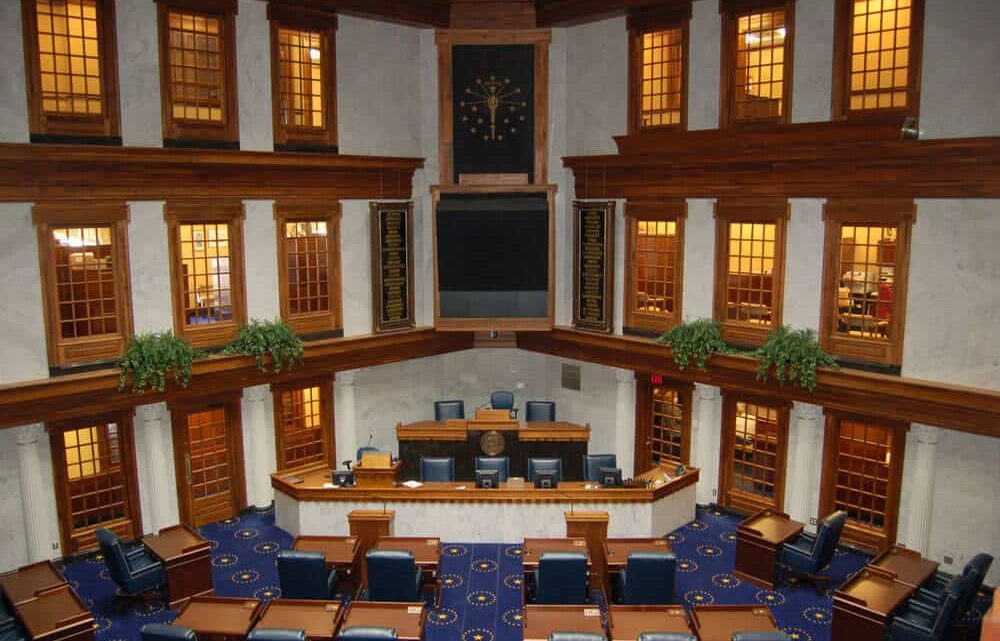by Whitney Downard, Indiana Capital Chronicle
April 18, 2023
The $43.3 billion state budget overcame another hours-long hurdle Monday evening, with Republicans adding a handful of amendments but resisting the majority of efforts to change the underlying bill.
Following Monday’s changes, the budget will need to pass the Senate again on Tuesday before heading to an inevitable conference committee to negotiate the final details. In particular, mental health and public health funding are the largest remaining questions and are likely to see big changes in the coming weeks.
The next revenue forecast is slated to be published on Wednesday and will inform the final version of the budget. The General Assembly has until the end of the month to finalize legislation.
Amendments added into the budget
Senators decided to incorporate a smattering of Republican amendments via voice votes, including one that would increase the document storage fee by $3 for county-level clerks and another to expand what economic development dollars could be used toward.
The governor’s and House budget both call those dollars part of the Regional Economic Acceleration and Development Initiative while senators named it the Collaborative Communities program. Those dollars, $500 million over the biennium, can now be used for child care facilities and recruiting young professionals.
However, a separate amendment would require that at least 10% of “deal closing” dollars from the Indiana Economic Development Corporation go toward counties with less than 50,000 residents.
Though the Republican supermajority did opt to accept one Democratic amendment – a statutory fix to restore regional sewer district authority – another 30 were defeated.
Defeated amendments included the perennial attempt to legalize marijuana for medicinal and recreational use, which Republican leadership has repeatedly rebuffed.
But Republicans also rejected calls to establish a climate solutions task force, which has a vocal youth activist base, or dedicate $2.5 million to address the state’s backlog of rape kits in need of testing. Another failed amendment would have given financial support to Indiana’s Task Force One, a search and rescue unit.
Sen. Fady Qaddoura introduced 25 amendments alone, calling down 16 for a vote and explicitly saying it was his sole opportunity to introduce Democratic bills passed over by Republicans earlier in the process. None of his amendments passed.
“I appreciate your patience with me. This is my only opportunity as a member of the minority to share my ideas on the floor,” Qaddoura, D-Indianapolis, said.
His amendments ran the gamut from property tax relief to tweaking the road funding formula to “fix” the calculation for urban areas.
In particular, Qaddoura attempted to eliminate a pilot program introduced in the Senate budget without fanfare that he said would “privatize” counsel for certain cases under the Department of Child Services in Marion County and around Allen County. Those two urban areas represent nearly half of the state’s population, Qaddoura said, and yet that language hadn’t been heard or vetted in a committee.
Only Sen. Mike Young, R-Indianapolis, defended the pilot and his Republican colleagues defeated the amendment.
Funding for mental, public health still TBD
Republicans who otherwise agreed with Democratic suggestions to increasing funding for mental health services under Senate Bill 1 or public health services under Senate Bill 4 urged waiting to finalize those numbers.
“I think in the next week and a half we just have to collaborate on what that (cell phone) fee will be,” Sen. Ryan Mishler, R-Mishawaka, said about funding for 988 mental health crisis services.
Federal law allows states to impose a cell phone fee of up to $1 monthly to fund 988, designed to be the mental health counterpart for 911, which is partially funded in Indiana by a $1 monthly fee. Mishler indicated last week that Republicans hadn’t settled on a final fee amount.
Alternatively, the public health line item is significantly less than previously requested in Gov. Eric Holcomb’s budget, now at $225 million over the biennium instead of a combined $347 million.
Sen. Andrea Hunley, D-Indianapolis, offered an amendment to increase funding to $100 million the first year followed by $200 million the next but it was opposed even by the author of the public health bill, Senate Bill 4.
“I would ask that you vote down this amendment, not because I don’t support fully funding Senate Bill 4, but because this is a work in progress,” Sen. Ed Charbonneau, R-Valparaiso, said. “People that are working on the budget are dealing with this and I don’t know where it’ll end up but I hope it’ll be fully funded.”
Democrats did voluntarily withdraw a couple of amendments saying ongoing negotiations with budget writers seemed positive, including two related to funding for local public defenders.
Sen. Eddie Melton, D-Gary, said he felt confident that a cigarette tax increase would be incorporated into the final budget, opting not to call his amendment to increase the $0.99 tax by $1.50.
“I am optimistic that this is going to move forward,” Melton said on the floor after introducing and then withdrawing the proposal.
Indiana Capital Chronicle is part of States Newsroom, a network of news bureaus supported by grants and a coalition of donors as a 501c(3) public charity. Indiana Capital Chronicle maintains editorial independence. Contact Editor Niki Kelly for questions: info@indianacapitalchronicle.com. Follow Indiana Capital Chronicle on Facebook and Twitter.














